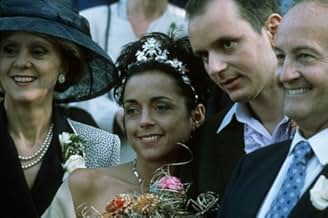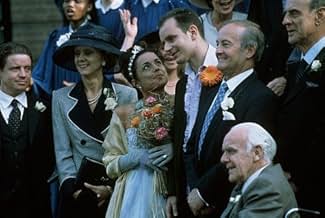VALUTAZIONE IMDb
6,7/10
2598
LA TUA VALUTAZIONE
A Londra, nell'ottobre 1993, l'Inghilterra affronterà l'Olanda nei preliminari del Mondiale. La guerra in Bosnia è al culmine e stanno arrivando profughi dall'ex Jugoslavia.A Londra, nell'ottobre 1993, l'Inghilterra affronterà l'Olanda nei preliminari del Mondiale. La guerra in Bosnia è al culmine e stanno arrivando profughi dall'ex Jugoslavia.A Londra, nell'ottobre 1993, l'Inghilterra affronterà l'Olanda nei preliminari del Mondiale. La guerra in Bosnia è al culmine e stanno arrivando profughi dall'ex Jugoslavia.
- Regia
- Sceneggiatura
- Star
- Premi
- 4 vittorie e 5 candidature totali
Recensioni in evidenza
This film highlights some of the problems faced by former Yugoslav refugees trying to start a new life in Britain. There are some light hearted moments like when a Serb and a Croat who were neighbours in their former homeland fight with each other and end up next to each other in the hospital (highlighting the basis of the Yugoslav war). Some of the more common refugee problems are also highlighted (you'd have to watch to find out). There is hardly any intensity in the movie but the story is still rather well told.
It is 1993 and England is a changing place. The impending World Cup qualifier with Holland is only going to end badly and immigration is back on the political agenda as refugees arrive from the former Yugoslavia, fleeing the Bosnian War. A group of people move in and around these events and find their lives impacted and ultimately changed by them.
With his incite into the story, Dizdar makes a worthy shot at a sort of Short Cuts ensemble piece that weaves several threads together in a way that ironically touches on the Bosnian war and British society. However, for all the credit it deserves for trying, this isn't a very successful attempt for several reasons. The overall sweep of the story works and it is interesting enough to carry it all along but it is in the specific stories where I wasn't feeling it. The major plot devices are always extreme and they prevented the story flowing and being as natural as I wanted it to be. This also limits the ability of the character to impact on me something not helped by how many characters and threads there were crammed into less than two hours. I wanted it to be better than it was but these problems did knock it down a bit for me.
The ensemble cast are nearly all good and no fault can be laid at their feet. At the start the characters are basic but they gradually overcome this and produce solid turns despite the limited character development available to them within the material. To pick one or two out would be difficult but the young football hooligan (forget the actors name) does well, while the sadly passed Coleman is always worth a note.
Overall this is an interesting film that aims high but hits a bit lower. The material is engaging and the energy to it almost carries off the excessive and exaggerated plot devices needed to keep it moving. The wide view also limits the impact each character and story has but still just about works. Not brilliant then by any means but a good try from Dizdar and at least it is more interesting and original than the romantic comedies and Lock Stock rip-offs that British cinema was and is churning out.
With his incite into the story, Dizdar makes a worthy shot at a sort of Short Cuts ensemble piece that weaves several threads together in a way that ironically touches on the Bosnian war and British society. However, for all the credit it deserves for trying, this isn't a very successful attempt for several reasons. The overall sweep of the story works and it is interesting enough to carry it all along but it is in the specific stories where I wasn't feeling it. The major plot devices are always extreme and they prevented the story flowing and being as natural as I wanted it to be. This also limits the ability of the character to impact on me something not helped by how many characters and threads there were crammed into less than two hours. I wanted it to be better than it was but these problems did knock it down a bit for me.
The ensemble cast are nearly all good and no fault can be laid at their feet. At the start the characters are basic but they gradually overcome this and produce solid turns despite the limited character development available to them within the material. To pick one or two out would be difficult but the young football hooligan (forget the actors name) does well, while the sadly passed Coleman is always worth a note.
Overall this is an interesting film that aims high but hits a bit lower. The material is engaging and the energy to it almost carries off the excessive and exaggerated plot devices needed to keep it moving. The wide view also limits the impact each character and story has but still just about works. Not brilliant then by any means but a good try from Dizdar and at least it is more interesting and original than the romantic comedies and Lock Stock rip-offs that British cinema was and is churning out.
Beautiful People deals with some grim & difficult topics war in Bosnia, drugs, divorce, illegal immigration & more (without giving away any secrets) & uses the currently rather popular device of intertwining story lines to do so, but carries it off with humour & elegance. Such a combination of themes could have been sordid & depressing or worse trite, but in contrast Beautiful People is joyous & exhilarating a real delight & well worthy of your time.
In contemporary London, five stories with refugees from former Yugoslavia are presented in a chaotic and mixed way, some of them with points of contact. The best and funniest story is about a drugged hooligan who travels to Rotterdam with two addicted friends to watch a soccer game between Netherlands x England. After the game, when England lost it, in the airport, he is so drugged in heroin that he sleeps inside a box of international aid to Bosnia. The box is dropped by parachute in the front of the war, and our `hero' wakes-up in the middle of a battle. He meets a young boy, who becomes blind, and helps people in an improvised hospital of the United Nations before coming back home. There is the story of a cinematographer who gets a kind of syndrome due to the horrors he witnessed in the war, specially the amputation of a leg without any resources. There is another story about a fight between a Croat and a Serbian, beginning in a bus and ending in the hospital in London. There is a story of a raped young woman who gets pregnant. Her husband wants that her English doctor makes an abortion. By the other hand, the doctor is full of personal problems with his wife. There is a romance between a refugee from former Yugoslavia and a daughter of a conservator English politician. The way the stories are presented looks like a documentary, or the news on television, and is very different. The movie does not present clichés and has lots of English black humor. I myself loved it. My vote is nine.
Title (Brazil): `Beautiful People'
Title (Brazil): `Beautiful People'
I went to the theatre cold, had heard nothing about Beautiful People beyond its title. I was fairly unimpressed with the first part of the movie; the opening scenes from the tussle of the bus were elegaically constructed and did serve as the 'running' commentary for the film, but other scenes were set up quite stodgily: the Conservative family with the renegade child (I did enjoy the element of class consciousness in the hospital scene where she hesitantly asks for help from the nurses); the father stuck with the kids when their mother leaves (because he's such a prat?); the artistic and neglectful mother... the stuff of many British films and almost every Sunday night teleplay. What lifts Beautiful People is its awareness, and consequent subversion, of this predictable British fare. From the second the skinhead wanders in a fairytale-like trance into a trolley of supplies destined for Bosnia, the film busts the genre wide open. This happenning gives the film permission to explore the stories to their possible happy resolutions. If only a racist skinhead could get his face pushed into the lives some of those he ignorantly attacks! The scene at the end, where the racists are reading a bedtime fairy story to the blinded Bosnian child is our cue that this part of the film has, indeed, been nothing more than a fairytale. All fairytales are a gory story with a moral twist from which children learn how life is. And so with the intent of this film. The daughter of a Conservative minister would never marry a refugee so he could stay in the country, and the family would certainly not accept such a marriage - think of the scandal! Yet, once the barrier of British realism has been rent asunder by the skinhead's fall into Bosnia (not quite Wonderland!), this becomes possible. The realism remained with the war scenes, and I think these are what we are supposed to have lodged in our minds when we leave the theatre. I can't imagine the real Bosnia was much different to this. The final message I took from the film is: if you had experienced it, then you would be craving for happy endings too. I liked it. I forgot how lumbering the first part of the film was once the filmmaker gave herself permission to dispense with realism. I left the theatre thinking very deeply about the conflict in Bosnia; which was as it should be.
Lo sapevi?
- Citazioni
Pero Guzina: [thanking his dinner hosts in his broken English] Thank you for your hostility.
- ConnessioniFeatures Quella fantastica pazza ferrovia (1970)
- Colonne sonorePity the Sadness
Written by Nicholas Holmes
Performed by Paradise Lost
I più visti
Accedi per valutare e creare un elenco di titoli salvati per ottenere consigli personalizzati
- How long is Beautiful People?Powered by Alexa
Dettagli
Botteghino
- Lordo Stati Uniti e Canada
- 264.292 USD
- Fine settimana di apertura Stati Uniti e Canada
- 13.987 USD
- 21 feb 2000
- Lordo in tutto il mondo
- 264.292 USD
- Tempo di esecuzione1 ora 47 minuti
- Colore
- Mix di suoni
- Proporzioni
- 1.85 : 1
Contribuisci a questa pagina
Suggerisci una modifica o aggiungi i contenuti mancanti






























